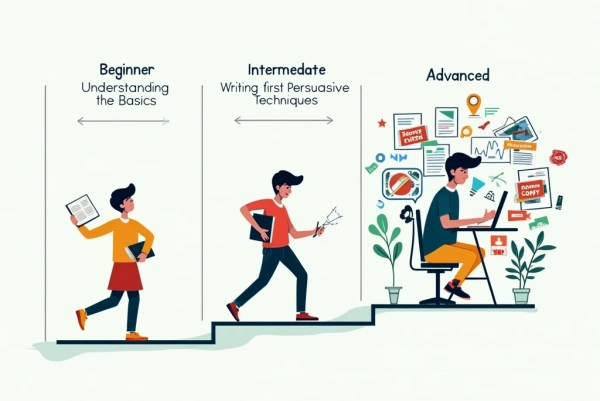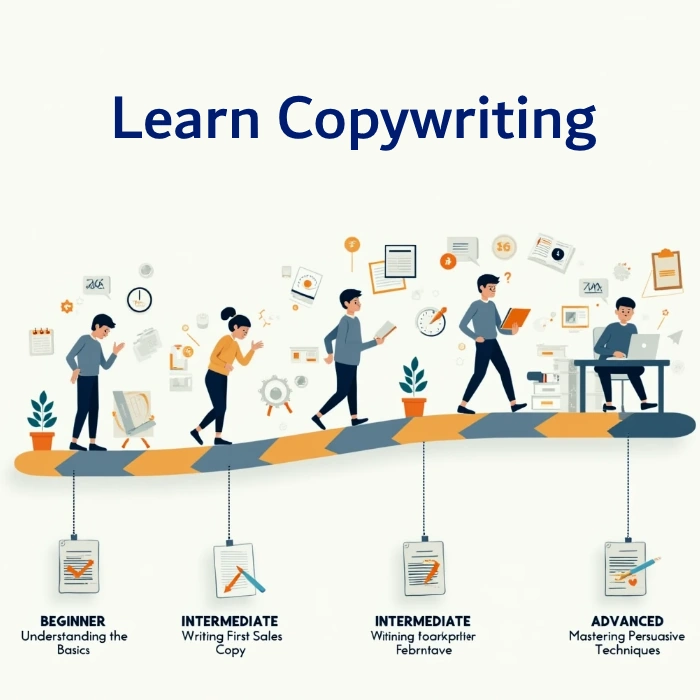Many aspiring writers wonder exactly how long it takes to learn copywriting. The journey to copywriting mastery follows different paths for each person. You might feel eager to predict your timeline from novice to professional copywriter. I understand this curiosity from my fifteen years in the field. The honest answer combines several key factors that influence your learning curve. Your background, dedication, practice methods, and career goals all shape your timeline. This article will map out realistic expectations for your copywriting journey.
The true meaning of copywriting mastery
What does becoming a copywriter actually involve?
Copywriting creates persuasive content that drives specific actions from readers. You must master the art of selling with words. This skill extends beyond basic writing ability into psychology and persuasion. Learning copywriting means developing a specialized communication toolkit. Your words must convince, engage, and convert casual readers into customers. This transformation requires time, practice, and strategic learning approaches.
Proficiency levels every copywriter must navigate
The copywriting journey divides into distinct stages of competence. Beginners focus on understanding fundamental principles and basic techniques. They often struggle with concise messaging and persuasive hooks. Intermediate copywriters craft effective copy that follows proven structures. They know the rules but sometimes lack distinctive style. Professional copywriters blend technical skill with creative intuition. They develop unique voices while consistently delivering results.
Diverse specializations that affect your learning path
The copywriting field contains many specialized paths to consider. Direct response copywriting focuses on immediate reader action. Content marketing builds long-term relationships through valuable information. Email copywriting demands attention-grabbing subject lines and conversational tone. Social media copy requires ultra-concise messaging with personality. Each specialization adds unique elements to your learning timeline. Most copywriters start with general skills before focusing on specific niches.
Setting realistic copywriting expectations
Many newcomers expect mastery within weeks rather than months or years. This misconception leads to frustration and premature surrender. Professional copywriting requires sustained effort across multiple skill dimensions. You’ll need time to internalize principles, develop habits, and refine techniques. Your progress will include plateaus followed by sudden breakthroughs. Expect an ongoing learning process rather than a fixed endpoint.
Discover also: How to Learn Copywriting from Scratch
Realistic timeline for learning copywriting skills
Your first month: Building fundamental knowledge
The initial weeks focus on understanding copywriting principles and structures. You’ll learn formulas like AIDA, PAS, and FAB during this stage. Daily practice should include analyzing effective copy examples. Expect to spend 2-3 hours daily studying copywriting fundamentals. Your first attempts will feel mechanical as you apply new concepts. Progress comes through consistent daily effort rather than occasional cramming.
Months 3-6: Developing practical skills
This period transforms theoretical knowledge into practical application skills. You’ll complete increasingly complex copywriting exercises and projects. Your writing gains structure but might still lack natural flow. This stage includes learning proper research methods for different audiences. You’ll recognize good copy but struggle to replicate it consistently. Regular feedback becomes crucial for identifying blind spots.
Months 6-12: Building your portfolio
The six-month mark typically signals readiness for client-facing work. You’ll create complete projects for real applications during this phase. Your growing portfolio demonstrates capabilities to potential clients. You’ll handle feedback more effectively and implement changes quickly. Most copywriters begin specializing in specific formats or industries now. Client work provides valuable real-world testing for your skills.
Years 1-2: Developing specialized expertise
This period transforms competent copywriters into valuable specialists. You’ll refine your voice and develop signature techniques. Most copywriters select specific niches or formats during this stage. Your work generates measurable results for clients consistently. You’ll require less time to produce effective copy. Your instincts improve through accumulated experience with different audiences.
Beyond 2 years: Mastery and advanced techniques
True mastery emerges after extensive professional experience and testing. You’ll develop nuanced understanding of consumer psychology and persuasion. Your copy consistently outperforms industry standards and expectations. You can create effective frameworks rather than following existing ones. Many copywriters begin mentoring others at this stage. Your expertise extends beyond writing into strategy and campaign planning.

Key factors influencing your learning timeline
Previous writing experience
Your writing background significantly impacts your copywriting learning curve. Former journalists adapt quickly to research and concise communication. Creative writers must adjust to more direct, persuasive approaches. Technical writers already understand structure but need persuasive elements. Complete beginners face steeper learning curves but avoid breaking bad habits. Your existing skills provide foundations that accelerate certain aspects.
Time commitment considerations
Full-time learners naturally progress faster than part-time practitioners. Daily practice builds momentum that weekly sessions cannot match. Three hours daily yields faster results than weekend cramming. Consistent short sessions outperform occasional marathon efforts. Your available time directly correlates with your learning pace. Create realistic schedules that match your life circumstances.
Learning methods and resources
Structured courses provide faster results than haphazard self-education. Mentorship accelerates growth through personalized guidance and feedback. Books offer depth but lack interactive elements and feedback mechanisms. Online communities provide peer support and contemporary perspectives. The best approach combines multiple learning methods simultaneously. Your learning style should dictate your primary resource choices.
Practice quality and feedback loops
Regular writing with expert feedback accelerates improvement dramatically. Critiques identify blind spots you cannot recognize yourself. Implementation of feedback creates rapid improvement cycles. Self-assessment skills develop gradually through external validation. Your growth depends more on feedback quality than practice quantity. Seek constructive criticism from experienced professionals whenever possible.
Natural aptitude factors
Some people naturally think in persuasive patterns and concepts. Others possess intuitive understanding of emotional triggers and responses. Creative problem-solvers adapt quickly to copywriting challenges. Analytical thinkers excel at research and audience understanding. Your natural strengths determine which aspects come easily. Everyone can learn copywriting despite varying natural starting points.
Discover also: Technical Skills for Copywriting to Transform Your Career
Accelerating your copywriting learning curve
Essential resources for faster mastery
Certain books provide foundational knowledge every copywriter needs. Start with “The Copywriter’s Handbook” by Robert Bly. “Breakthrough Advertising” by Eugene Schwartz offers advanced concepts. Online courses from AWAI or CopyHackers provide structured learning paths. Communities like The Copywriter Club offer peer feedback. Your resource selection should evolve with your skill level.
Daily practices that build skills efficiently
Handwriting successful advertisements trains your brain to recognize patterns. Writing headlines daily develops crucial attention-grabbing skills. Rewriting existing copy from memory reinforces structural understanding. Timed writing sessions improve production speed and efficiency. Your daily routine should include varied exercises targeting different skills. Consistency matters more than duration for these practices.
Finding effective mentorship
Professional copywriters often offer mentorship programs with hands-on guidance. Agency internships provide real-world experience with senior supervision. Coaching relationships accelerate growth through personalized feedback. Mastermind groups offer peer mentorship and accountability. Your mentor should match your goals and learning style. Investment in mentorship typically yields the fastest improvement.
Studying successful copy examples
Swipe files collect exceptional copy examples for regular study. Breaking down successful campaigns reveals underlying principles. Analyzing copy from different eras shows timeless techniques. Comparing competitors’ approaches highlights effective industry strategies. Your analysis should focus on principles rather than surface elements. Regular study trains your eye for effective persuasion techniques.
Tracking systems for measuring improvement
Performance metrics provide objective evidence of your progress. Before-and-after comparisons highlight your evolving skills. Client feedback tracking identifies recurring improvement areas. Conversion rate changes demonstrate real-world effectiveness. Your measurement systems should align with professional standards. Data-driven improvement accelerates learning through targeted practice.
Discover also: How Much to Pay a Copywriter
Real stories: Learning timeframes from professional copywriters
Case study: From beginner to professional in 18 months
Sarah transitioned from teaching to copywriting through intensive study. She devoted twenty hours weekly to structured learning programs. Her first client work began after four months of daily practice. She specialized in educational technology after nine months. Her income matched her previous career at the eighteen-month mark. Her background in communication provided valuable transferable skills.
Overcoming common roadblocks on the journey
Most copywriters face confidence issues during their early client work. Perfectionism frequently prevents completion and submission of projects. Comparison with established professionals creates discouragement feelings. Pricing challenges create feast-or-famine work patterns for many. These obstacles require mindset solutions alongside technical skills. Community support helps navigate these common challenges.
Signs of progress even when feeling stuck
Your vocabulary naturally shifts toward more persuasive language patterns. Headlines become easier to generate with practice. You recognize persuasion techniques in everyday advertising automatically. Client feedback becomes increasingly positive over time. These subtle changes indicate real progress beneath frustration. Celebrate small wins during challenging learning plateaus.
Discover also: Can Copywriting Make You Rich ?
The return on investment for copywriting skills
Career opportunities and earning potential
Entry-level copywriters typically earn $45,000-$65,000 annually. Experienced specialists often command $85,000-$150,000+ yearly salaries. Freelance copywriters set rates from $50-$250+ hourly. Direct response specialists earn additional income through royalty arrangements. Your earning ceiling depends largely on specialization and results. The financial return typically justifies the learning investment.
Transferable skills beyond copywriting jobs
Persuasive writing improves communication across all professional contexts. Marketing understanding benefits entrepreneurs and business professionals. Research skills transfer to journalism, content creation, and analysis. Psychology insights improve leadership and interpersonal effectiveness. These secondary benefits extend beyond direct copywriting applications. Your skills remain valuable across various career paths.
Comparison with other in-demand digital skills
Copywriting requires less technical knowledge than programming or data science. The learning curve proves gentler than video production or graphic design. Entry barriers remain lower than specialized fields like SEO or PPC management. Copywriting skills complement rather than compete with other digital specialties. This accessibility makes copywriting an attractive skill investment option.
The journey to copywriting proficiency follows a unique path for each person. The question of how long it takes to learn copywriting has multiple answers. Expect 6-12 months to achieve professional competence with consistent effort. Full mastery requires 2+ years of dedicated practice and client work. Your background, commitment, and learning methods significantly influence this timeline. The investment yields valuable skills that remain relevant across changing markets. Begin your copywriting journey with realistic expectations and strategic learning approaches. Your future success depends more on persistence than natural talent.
